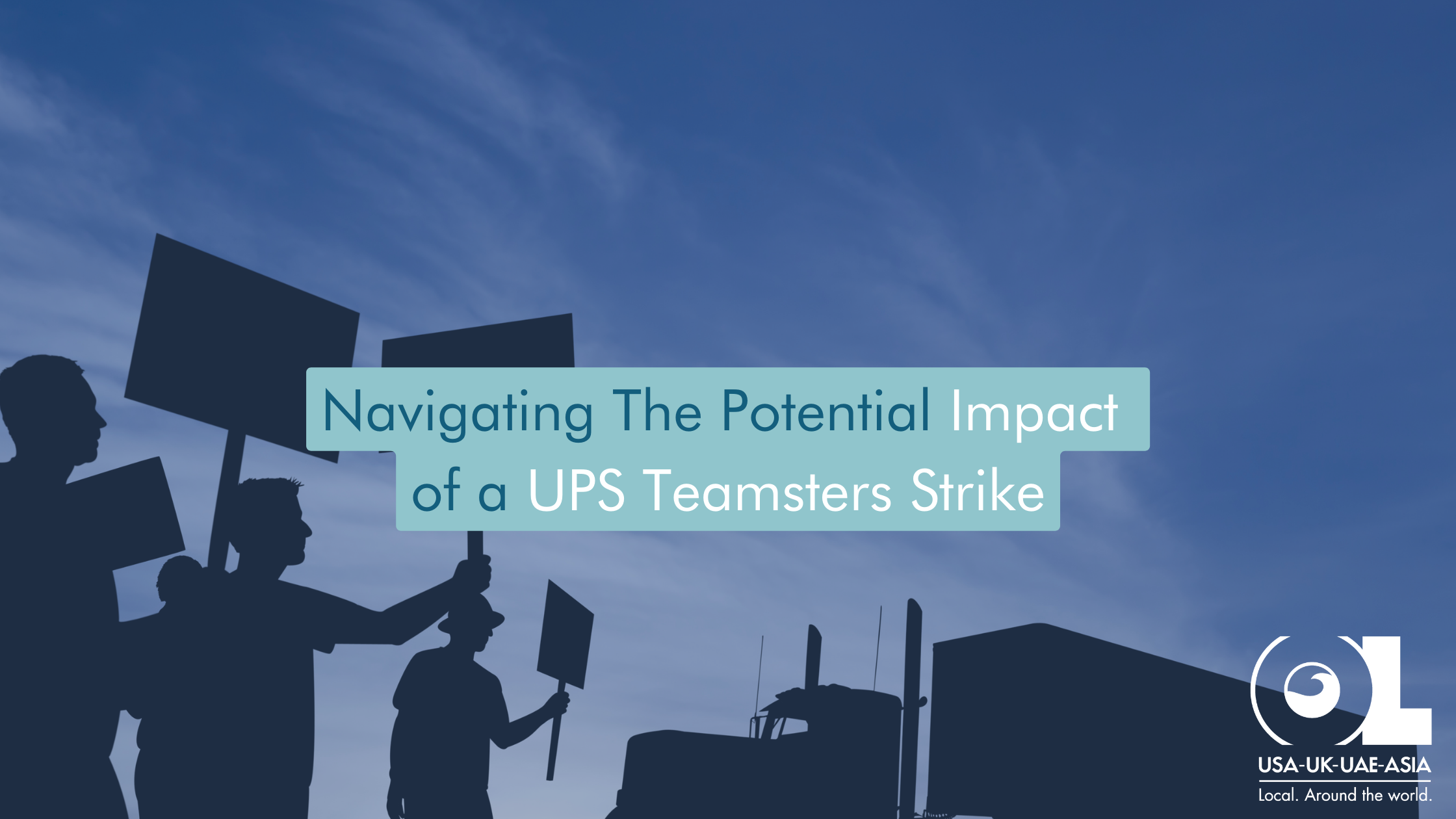The global supply chain has been through an awful lot over the past several years. Covid impacts, the middle class spending spree, overflowing warehouses, record levels of inflation, a drought around the Panama Canal, shipping crunches, and a war have each revealed weaknesses in shipping and logistics activity. Rates to move cargo have been on a metaphorical rollercoaster since 2020, spiking and collapsing at intervals that remain difficult to accurately predict.
Now, a new disruption is looming, and it promises to have a tremendous impact: the UPS Teamsters Union’s contract expires on July 31st, and the 340,000 union workers may go on strike starting August 1st. Let’s talk about what the impact might be, and how you can get through it with as little disruption to your business as possible.
The UPS General Strike – Potential Impact on Businesses
A UPS general strike may send shockwaves through the supply chain, affecting businesses of all sizes and industries. As one of the largest shipping providers globally, UPS plays a pivotal role in transporting goods to destinations worldwide. However, a labor strike can disrupt the smooth flow of packages and have far-reaching consequences for businesses relying on UPS services.
Delays in deliveries are one of the most immediate and visible impacts of a UPS strike. With shipments held up, businesses may struggle to meet customer expectations, leading to frustration and potential loss of sales. Moreover, the delay in goods reaching customers’ hands can have a domino effect on inventory management, causing inventory levels to become unbalanced.
The rise in shipping costs is another significant concern during a UPS strike. As businesses scramble to find alternative shipping solutions, demand for other carriers may surge, leading to increased shipping rates. Within the US, there is simply no other single carrier who can handle their own shipping volume and UPS’s, as UPS remains the single largest delivery service in the country, responsible for tens of millions of package transportation every day.
Working with a Partner
Businesses with a 3PL partner enter a UPS strike situation with a considerable advantage. 3PLs are adept at quickly adapting to changing circumstances and can provide alternative shipping arrangements to help mitigate supply chain disruptions. Leveraging their extensive network of local distribution centers and other carriers, 3PLs can ensure that shipments still reach their destinations on time, even during a UPS strike.
One of the critical benefits of having a 3PL partner is the expertise in inventory management. 3PLs use advanced technologies and data-driven strategies to optimize inventory levels, preventing excess stock or stockouts during a UPS strike. This proactive approach to inventory control minimizes financial losses and ensures that businesses can continue meeting customer demands.
Clear and effective communication with customers is crucial during a UPS strike, and 3PLs excel in this area. With dedicated customer service teams, businesses partnering with a 3PL can maintain open lines of communication with clients, keeping them informed about delays, offering alternative solutions, and managing customer expectations with professionalism and care.
Furthermore, a 3PL’s experience in negotiations can be a game-changer during a strike. They have established relationships with various carriers and can use their leverage to secure competitive rates and terms. This ability to strike a balance between cost optimization and maintaining service quality can be a significant relief for businesses during the UPS strike.
Businesses Without a 3PL Partner
For businesses without a 3PL partner, navigating a UPS strike can be more challenging. Finding alternative shipping solutions becomes a time-consuming and complex process, as businesses must individually negotiate with carriers and manage transportation arrangements.
Inventory management can become a delicate balancing act for businesses without a 3PL’s expertise. Lacking real-time visibility and advanced inventory optimization tools, they may face difficulties in maintaining optimal stock levels, leading to higher carrying costs or inventory shortages.
Effective communication with customers during a UPS strike is crucial for maintaining trust and loyalty. However, without the support of a dedicated customer service team from a 3PL, businesses may struggle to address customer inquiries promptly, leading to customer dissatisfaction and potential damage to their brand reputation.
The absence of a 3PL’s negotiation skills can also put businesses without a partner at a disadvantage. Limited bargaining power may result in less favorable shipping rates and contractual terms, impacting the overall profitability of their operations during the UPS strike.
Learning from the Experience – Making Informed Decisions
The impending strike may serve as a valuable learning opportunity for businesses of all kinds. It may highlight the critical importance of logistics preparedness and adaptability in today’s ever-changing business landscape. After years of other disruptions, this strike might be the one that sparks the kind of changes businesses need to make to harden their supply chains.
For businesses without a 3PL partner, the UPS strike highlights the need to reassess their logistics resilience and explore the potential benefits of collaborating with a reliable 3PL. Forming a partnership with a 3PL can provide businesses with access to a wealth of expertise, technologies, and carrier relationships that can help them weather the storm during future disruptions.
The impact of a UPS general strike on businesses underscores the importance of a well-structured logistics network. While businesses with a 3PL partner can navigate challenges more efficiently, those without one have the opportunity to take proactive steps to strengthen their logistics capabilities. By reevaluating their logistics strategies and considering the advantages of partnering with a reliable 3PL, businesses can enhance their resilience and operational efficiency, enabling them to thrive amidst uncertainties in the ever-evolving logistics landscape. Ultimately, the key takeaway is to be proactive and make informed decisions that secure supply chains and optimize logistics operations to stay competitive and deliver exceptional service to customers, no matter the circumstances.



